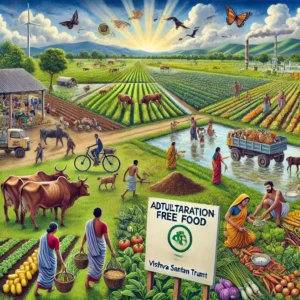+91 9760226405
विश्व सनातन ट्रस्ट
Agricultural and Food Initiatives
 Agricultural and Food Initiatives: A Detailed Overview
Agricultural and Food Initiatives: A Detailed OverviewThe Vishwa Sanatan Trust (VST) focuses on initiatives that enhance agricultural productivity, promote food safety, and create sustainable livelihoods. Here’s how these efforts are structured and the Trust’s contributions to each:
Objective: Support sustainable cattle farming to boost dairy production, organic manure availability, and rural income.
Objective: Educate farmers and consumers about the benefits of organic farming to foster eco-friendly agriculture and healthy lifestyles.
Objective: Ensure the availability of pure and safe food, free from harmful additives and chemicals.
Offers support to small-scale producers in adhering to safety and quality standards, enabling them to compete in larger markets.
Objective: Create sustainable livelihoods in agriculture and food processing sectors, particularly in rural areas.
These initiatives aim to create a self-reliant, healthy, and sustainable agricultural ecosystem. By integrating traditional knowledge with modern practices, VST ensures that the initiatives benefit both farmers and consumers while addressing environmental and economic challenges.
The Vishva Sanatan Trust has been established with the aim of reviving Indian Sanatan Dharma and traditions, promoting social cooperation, and advancing philanthropy. Our primary objective is to foster a spirit of collaboration in the fields of education, health, and employment.
मुख्य कार्यालय : बी -18 नटराजपुराम एक्सटेंशन कमला नगर , आगरा